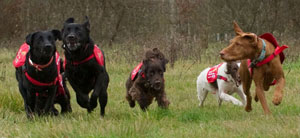
About Medical Detection Dogs
About Medical Detection Dogs
Frequently asked questions about Bio-Detection Dogs
How long does it take to train a bio-detection dog? The length of time to train a bio-detection dog varies depending on a number of things, such as the odour they are being trained to detect, the sample type they are using, and the dog itself (all dogs learn at different speeds, the same as humans). It generally takes 6-8 months for a dog to reach a good level of performance.
How often do the Bio-detection Dogs work? They come into work at our centre in Great Horwood up to 4 days a week, and work for short periods of up to about 20 minutes at a time. There are lots of opportunities for rest and playtime. The dogs view their work as a great game that they love playing.
Where do they live? The charity has a no-kennel policy. All our bio-detection dogs live in homes as part of a caring family with our fantastic volunteer fosterers, and lead normal, happy lives as pet dogs. They are dropped off in the morning and picked up in the evening.
Do you offer a screening service? We do not currently offer a cancer screening service. Although other published studies indicate high levels of accuracy, until we have published robust, acceptable accuracy rates for the detection of a particular type of cancer we are unable to offer a screening service to clinicians. This is however one of our goals, and would always be undertaken under the supervision of a medical professional.
Can you supply me with a personal bio-detection dog? Our bio-detection dogs work only on site sniffing samples as part of our research studies, and unfortunately we cannot provide dogs to individuals to detect cancer or other such diseases.
What are the dogs detecting? With their incredible sense of smell dogs can detect the minute odours now understood to be associated with many cancers and other diseases. Bio Detection Dogs are trained to detect the odour of volatiles associated with the disease present in urine, faecal, skin swabs or breath samples. The dogs work on samples in the bio-detection room at the training centre and are not trained to detect the odour on a person.
What type of training do you use? Our fundamental training method is reward based and we use clicker training for all our bio-detection work. Dogs are rewarded with a food treat or tennis ball play when they make an accurate assessment of the samples they are working on.
What is your aim? The dogs have the capacity to provide second line diagnostic support for cancers that are currently difficult to diagnose reliably, such as prostate cancer. Our research will also inform and enable the development of electronic systems using the information that the dogs have told us.
What other diseases could bio-detection dogs be used to detect? All diseases appear to have a biochemical change which causes a change in odour in our bodies, and has been used by physicians for centuries to inform the diagnosis and treatment of disease. The potential therefore for the bio-detection of all kinds of disease, not just cancer, is huge. We are currently actively researching the detection of Parkinson’s disease, malaria, and bacterial infections. The possibilities for other disease areas are endless, and limited primarily by funding.
